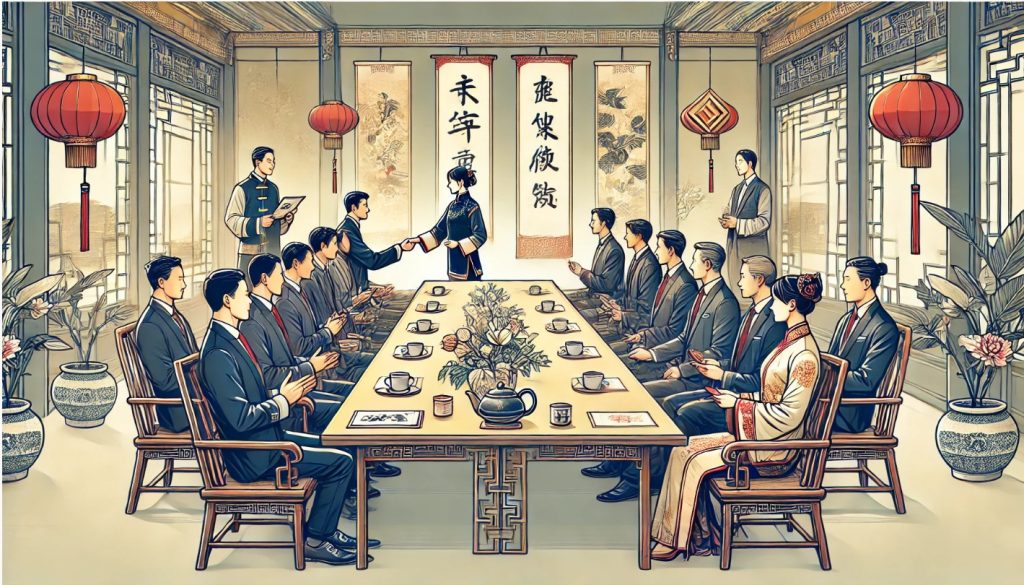Business etiquette in China is deeply influenced by the country’s rich history, culture, and traditions. As one of the world’s largest economies, China has become a critical player in global trade and business, with its unique approach to conducting business requiring foreign professionals and companies to understand local customs and expectations. Adhering to the proper business etiquette in China not only facilitates smoother interactions but also fosters trust and respect, essential components of successful business relationships in the country.
Understanding Chinese Business Culture
Confucian Influence on Business Practices
One of the fundamental aspects of Chinese business etiquette is the influence of Confucianism, which emphasizes values such as respect for authority, harmony, and the importance of relationships. Confucian teachings have shaped many facets of Chinese society, and these principles continue to permeate business practices today.
Confucianism stresses the importance of hierarchical structures in relationships, both personal and professional. This manifests in the Chinese business environment, where respect for seniority, the acknowledgment of power dynamics, and a strong sense of collective responsibility are valued. Understanding these cultural principles is essential for any foreign businessperson looking to establish lasting and meaningful connections in China.
Guanxi: The Importance of Relationships
In China, business relationships are not just transactional; they are rooted in the concept of guanxi (关系), which refers to the network of personal connections and relationships that are crucial to doing business. The term “guanxi” can be translated as “connections” or “relationships,” but it carries a deeper meaning that encompasses trust, mutual obligations, and reciprocity.
Building strong guanxi is vital in Chinese business culture. It involves developing personal relationships over time, demonstrating loyalty, and making the effort to maintain these relationships through both professional and social engagements. In China, doing business is often a long-term endeavor, and fostering genuine, reliable relationships is considered far more important than quick wins or short-term financial gains.
Building Guanxi
To establish guanxi, you need to invest time and effort in getting to know your Chinese counterparts. This may involve socializing outside of work, such as attending meals or informal gatherings, where business can be discussed in a more relaxed and personal setting. Showing respect, being patient, and allowing relationships to develop naturally will help you build trust and enhance your reputation in the business community.
Hierarchical Structures in the Workplace
China’s business environment is highly hierarchical, with clear distinctions between levels of authority and seniority. Understanding these hierarchies is essential for effective communication and decision-making within Chinese organizations.
In Chinese business culture, the most senior person in a meeting is often the one who makes decisions, and their opinions are highly respected. It’s important to show deference to senior leaders and avoid interrupting or contradicting them during discussions. Moreover, individuals are typically addressed by their titles and surnames, which underscores the respect for authority in Chinese society.
Role of the Leader
The leader or CEO of a Chinese company is typically expected to take charge and provide guidance to employees. In meetings, it’s customary to direct all comments and questions to the most senior person in the room. It’s essential to be aware of who the decision-makers are and tailor your approach accordingly.
Greetings and Interactions
The Importance of Greetings
First impressions in China are vital, and greetings are an important part of establishing a positive relationship. In business settings, the formality of the greeting often reflects the level of respect between individuals. A handshake is the most common form of greeting in China, but it is often softer than what might be expected in Western cultures. A firm, but not overly strong, handshake accompanied by a respectful nod is considered appropriate.
Introducing Yourself
When introducing yourself, it is customary to offer your full name and your job title. In China, titles are important, and it is crucial to use them appropriately when addressing someone, especially if they hold a senior position. You may also wish to present your business card during introductions, and it is important to do so with both hands as a sign of respect. When receiving a business card, take a moment to examine it carefully before putting it away to show respect to the person you are engaging with.
Addressing People
In China, the use of titles is vital, particularly in formal settings. While it is common to use titles such as “Mr.” or “Ms.” in Western cultures, in China, addressing someone by their professional or academic title is more customary. For example, if someone holds a PhD, it is respectful to refer to them as “Dr.” rather than by their first name. If you’re unsure about someone’s title, it’s better to err on the side of formality, as using the wrong title can be considered disrespectful.
The Role of Age and Seniority
Age and seniority play a significant role in Chinese business etiquette. Older and more senior individuals are typically given priority in conversations, and their opinions hold more weight in decision-making. In group settings, younger people are expected to listen more and speak less, deferring to their elders for guidance.
Non-Verbal Communication
In China, non-verbal cues are often just as important as verbal communication. It’s essential to pay attention to body language, tone of voice, and facial expressions, as they can convey important messages. Maintaining a calm and composed demeanor is valued in business, and any display of anger, frustration, or frustration can be seen as unprofessional or disrespectful.
Eye contact is another critical aspect of non-verbal communication in China. While it is important to maintain eye contact to show attentiveness and respect, too much prolonged eye contact may be perceived as confrontational or overly assertive. The key is to strike a balance that conveys attentiveness without coming across as overly aggressive.
Meetings and Negotiations
The Importance of Punctuality
Punctuality is highly valued in China, particularly in business settings. Arriving late to a meeting can be perceived as disrespectful and unprofessional. It’s advisable to arrive at least 10 to 15 minutes early for any scheduled meetings. Being on time shows that you respect your counterparts and value their time.
Structure of Meetings
Meetings in China tend to be formal, and they often start with a period of polite conversation before getting to the business at hand. Small talk may focus on non-controversial topics like the weather, travel, or shared interests. It’s important not to jump straight into business without first establishing rapport. In many cases, the first meeting may not involve actual negotiations but instead focus on getting to know each other and establishing trust.
Decision-Making Process
Decision-making in China tends to be a more collective process than in Western cultures. Senior leaders typically have the final say, but decisions are often discussed with a wider group of colleagues or advisors before being made. It is important to be patient during the decision-making process and avoid pushing for a quick resolution.
In some cases, decisions may be postponed or left undecided during the initial stages of negotiation. This is partly due to the value placed on harmony and consensus. Rushing to close a deal or aggressively pursuing an agreement can be counterproductive in China, where business decisions are often approached with careful consideration.
Negotiation Style
When it comes to negotiation, Chinese businesspeople often adopt a more indirect and subtle approach compared to their Western counterparts. They value maintaining harmony and face, which can make negotiations slower and more delicate. The concept of face (面子, miànzi) is central to Chinese culture and refers to one’s social standing or reputation. It’s essential to avoid embarrassing or putting someone in a position where they may lose face, as this can damage a business relationship irreparably.
The Role of Silence
Silence during negotiations is not necessarily uncomfortable in Chinese business culture. Often, moments of quiet reflection are valued, and your Chinese counterparts may take time to consider your proposal before responding. Avoid the temptation to fill silence with nervous chatter, as this could be seen as impatience or a lack of respect.
Bargaining and Flexibility
Bargaining is a common feature of Chinese business negotiations, particularly when discussing pricing or contract terms. Expect some level of haggling and don’t be surprised if your initial offer is met with resistance or counter-offers. Chinese negotiators often test the boundaries of your flexibility, and it’s important to be prepared for give-and-take.
While flexibility is important, it’s also crucial to remain firm in areas that are critical to your business interests. However, it’s best to frame your position in terms that highlight mutual benefit, as this approach is more likely to resonate with your Chinese counterparts.
Gift-Giving and Social Etiquette
The Importance of Gift-Giving
Gift-giving plays a significant role in Chinese business culture, particularly when it comes to expressing appreciation, goodwill, or cementing a business relationship. Offering a thoughtful gift can demonstrate respect and help build rapport. However, it’s important to understand the customs around gift-giving to avoid any unintentional faux pas.
Types of Gifts
Appropriate gifts in China may include high-quality items such as tea, wine, or luxury goods, often with a focus on quality rather than extravagance. It’s important to avoid gifts that may be seen as too personal or extravagant, as this may make the recipient feel uncomfortable. Furthermore, it’s best to avoid gifts that are associated with bad luck or negative symbolism, such as clocks (which are associated with death) or sharp objects (which symbolize severing ties).
How to Present a Gift
When presenting a gift, it should be given with both hands as a sign of respect. In some cases, the recipient may initially refuse the gift out of politeness, but don’t be discouraged. Politely insist and offer the gift again. After receiving a gift, it’s customary to express gratitude, but avoid opening the gift immediately in front of the giver, as this may be seen as overly eager or rude.
Dining Etiquette
Meals are an essential part of Chinese business culture, and many business deals and relationships are established over shared meals. Dining etiquette is formal, with several important considerations to keep in mind.
When invited to a meal, it’s customary to wait for the host to begin eating before starting. Additionally, you should try to sample everything on the table, as this demonstrates respect for the host’s efforts. Toasting is a common feature of Chinese dining culture, and it’s important to participate in these toasts, but always offer a toast to the most senior person at the table first.
Handling Alcohol
In China, drinking alcohol during business meals is common, and it is often seen as a way to build relationships and demonstrate trust. If offered a drink, it’s polite to accept, but it’s also acceptable to decline if you don’t wish to drink alcohol. When participating in toasts, you should raise your glass to the senior person’s level and take a sip. In Chinese culture, finishing your glass in one go is often seen as a gesture of respect. However, pace yourself if you’re not accustomed to drinking.







